Financial Management Report: Autotrader, COVID, and Investors
VerifiedAdded on 2023/01/06
|10
|3275
|80
Report
AI Summary
This report provides an in-depth analysis of Autotrader's financial management strategies, particularly in response to the COVID-19 pandemic. It examines how Autotrader raised capital through equity and debt, focusing on the implications of these decisions. The report also assesses the impact of COVID-19 on financial management, including working capital and short-term and long-term financing. It explores strategies for managing inventory, receivables, payables, and cash flow during economic uncertainty. Furthermore, the report investigates the consequences of dividend cancellation on investors, discussing dividend policies and relevant financial theories. The analysis extends to how Carfan Advertising can mitigate the impacts of COVID-19 on its finances. This report offers valuable insights into financial planning, risk management, and the importance of adapting to challenging economic conditions.

Financial Management
1
1
Paraphrase This Document
Need a fresh take? Get an instant paraphrase of this document with our AI Paraphraser
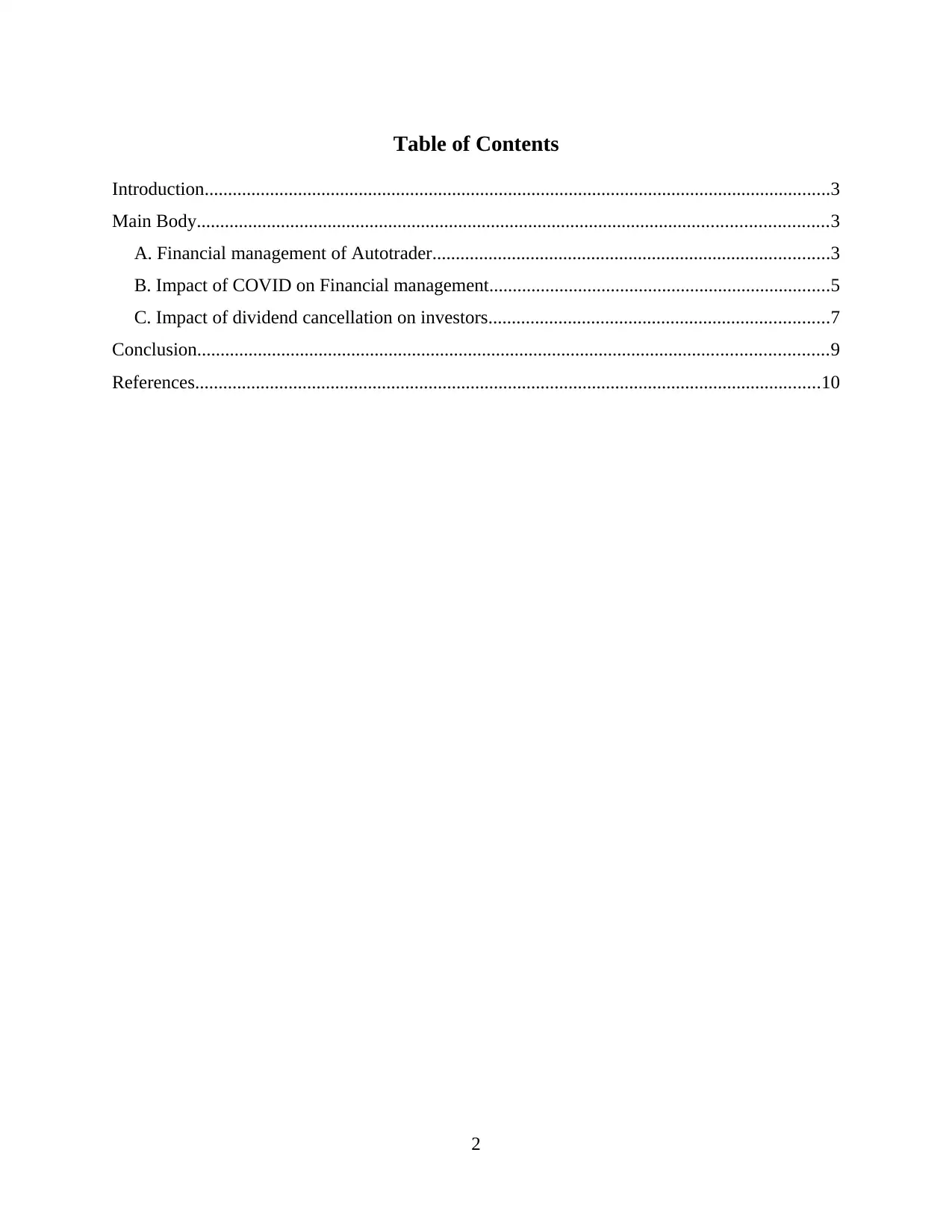
Table of Contents
Introduction......................................................................................................................................3
Main Body.......................................................................................................................................3
A. Financial management of Autotrader.....................................................................................3
B. Impact of COVID on Financial management.........................................................................5
C. Impact of dividend cancellation on investors.........................................................................7
Conclusion.......................................................................................................................................9
References......................................................................................................................................10
2
Introduction......................................................................................................................................3
Main Body.......................................................................................................................................3
A. Financial management of Autotrader.....................................................................................3
B. Impact of COVID on Financial management.........................................................................5
C. Impact of dividend cancellation on investors.........................................................................7
Conclusion.......................................................................................................................................9
References......................................................................................................................................10
2
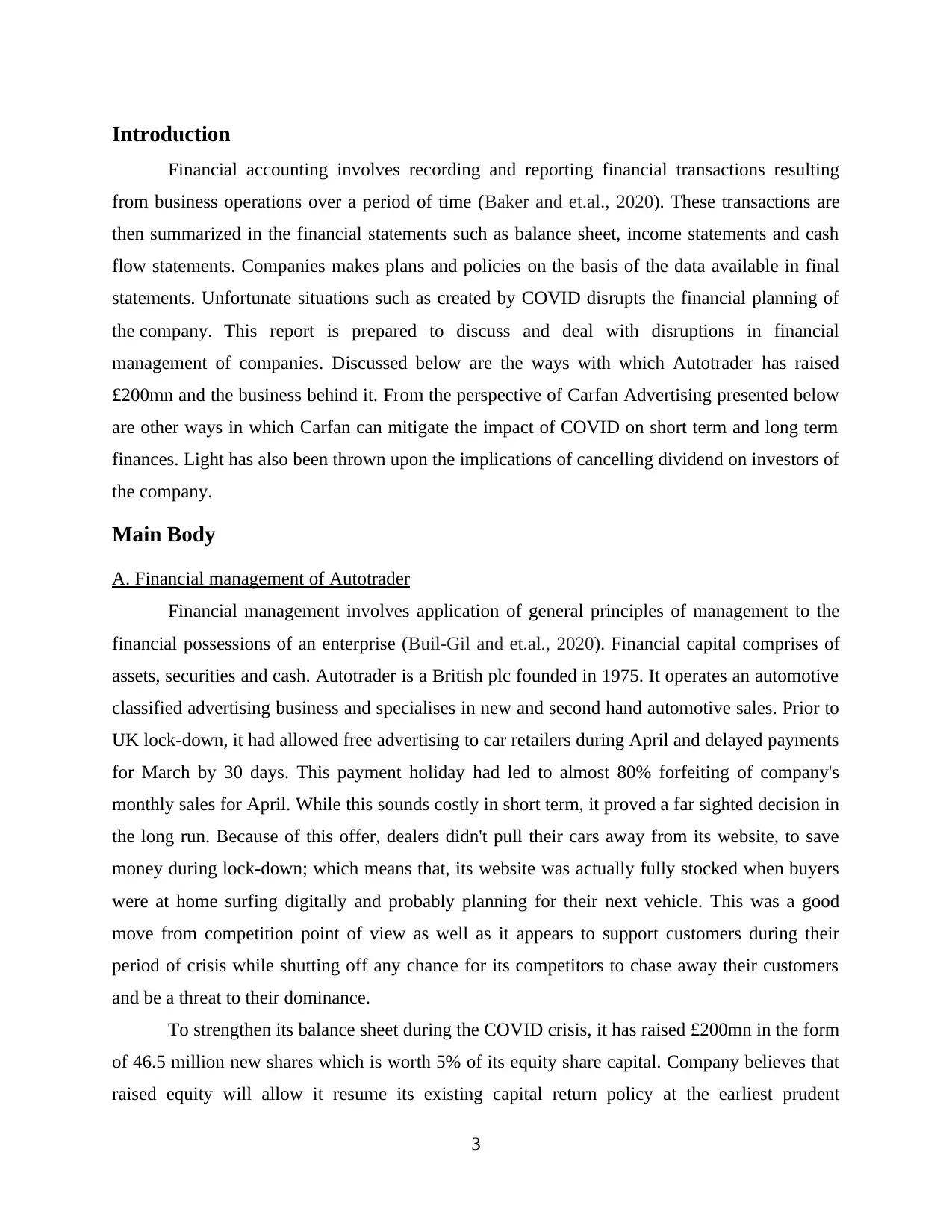
Introduction
Financial accounting involves recording and reporting financial transactions resulting
from business operations over a period of time (Baker and et.al., 2020). These transactions are
then summarized in the financial statements such as balance sheet, income statements and cash
flow statements. Companies makes plans and policies on the basis of the data available in final
statements. Unfortunate situations such as created by COVID disrupts the financial planning of
the company. This report is prepared to discuss and deal with disruptions in financial
management of companies. Discussed below are the ways with which Autotrader has raised
£200mn and the business behind it. From the perspective of Carfan Advertising presented below
are other ways in which Carfan can mitigate the impact of COVID on short term and long term
finances. Light has also been thrown upon the implications of cancelling dividend on investors of
the company.
Main Body
A. Financial management of Autotrader
Financial management involves application of general principles of management to the
financial possessions of an enterprise (Buil-Gil and et.al., 2020). Financial capital comprises of
assets, securities and cash. Autotrader is a British plc founded in 1975. It operates an automotive
classified advertising business and specialises in new and second hand automotive sales. Prior to
UK lock-down, it had allowed free advertising to car retailers during April and delayed payments
for March by 30 days. This payment holiday had led to almost 80% forfeiting of company's
monthly sales for April. While this sounds costly in short term, it proved a far sighted decision in
the long run. Because of this offer, dealers didn't pull their cars away from its website, to save
money during lock-down; which means that, its website was actually fully stocked when buyers
were at home surfing digitally and probably planning for their next vehicle. This was a good
move from competition point of view as well as it appears to support customers during their
period of crisis while shutting off any chance for its competitors to chase away their customers
and be a threat to their dominance.
To strengthen its balance sheet during the COVID crisis, it has raised £200mn in the form
of 46.5 million new shares which is worth 5% of its equity share capital. Company believes that
raised equity will allow it resume its existing capital return policy at the earliest prudent
3
Financial accounting involves recording and reporting financial transactions resulting
from business operations over a period of time (Baker and et.al., 2020). These transactions are
then summarized in the financial statements such as balance sheet, income statements and cash
flow statements. Companies makes plans and policies on the basis of the data available in final
statements. Unfortunate situations such as created by COVID disrupts the financial planning of
the company. This report is prepared to discuss and deal with disruptions in financial
management of companies. Discussed below are the ways with which Autotrader has raised
£200mn and the business behind it. From the perspective of Carfan Advertising presented below
are other ways in which Carfan can mitigate the impact of COVID on short term and long term
finances. Light has also been thrown upon the implications of cancelling dividend on investors of
the company.
Main Body
A. Financial management of Autotrader
Financial management involves application of general principles of management to the
financial possessions of an enterprise (Buil-Gil and et.al., 2020). Financial capital comprises of
assets, securities and cash. Autotrader is a British plc founded in 1975. It operates an automotive
classified advertising business and specialises in new and second hand automotive sales. Prior to
UK lock-down, it had allowed free advertising to car retailers during April and delayed payments
for March by 30 days. This payment holiday had led to almost 80% forfeiting of company's
monthly sales for April. While this sounds costly in short term, it proved a far sighted decision in
the long run. Because of this offer, dealers didn't pull their cars away from its website, to save
money during lock-down; which means that, its website was actually fully stocked when buyers
were at home surfing digitally and probably planning for their next vehicle. This was a good
move from competition point of view as well as it appears to support customers during their
period of crisis while shutting off any chance for its competitors to chase away their customers
and be a threat to their dominance.
To strengthen its balance sheet during the COVID crisis, it has raised £200mn in the form
of 46.5 million new shares which is worth 5% of its equity share capital. Company believes that
raised equity will allow it resume its existing capital return policy at the earliest prudent
3
⊘ This is a preview!⊘
Do you want full access?
Subscribe today to unlock all pages.

Trusted by 1+ million students worldwide
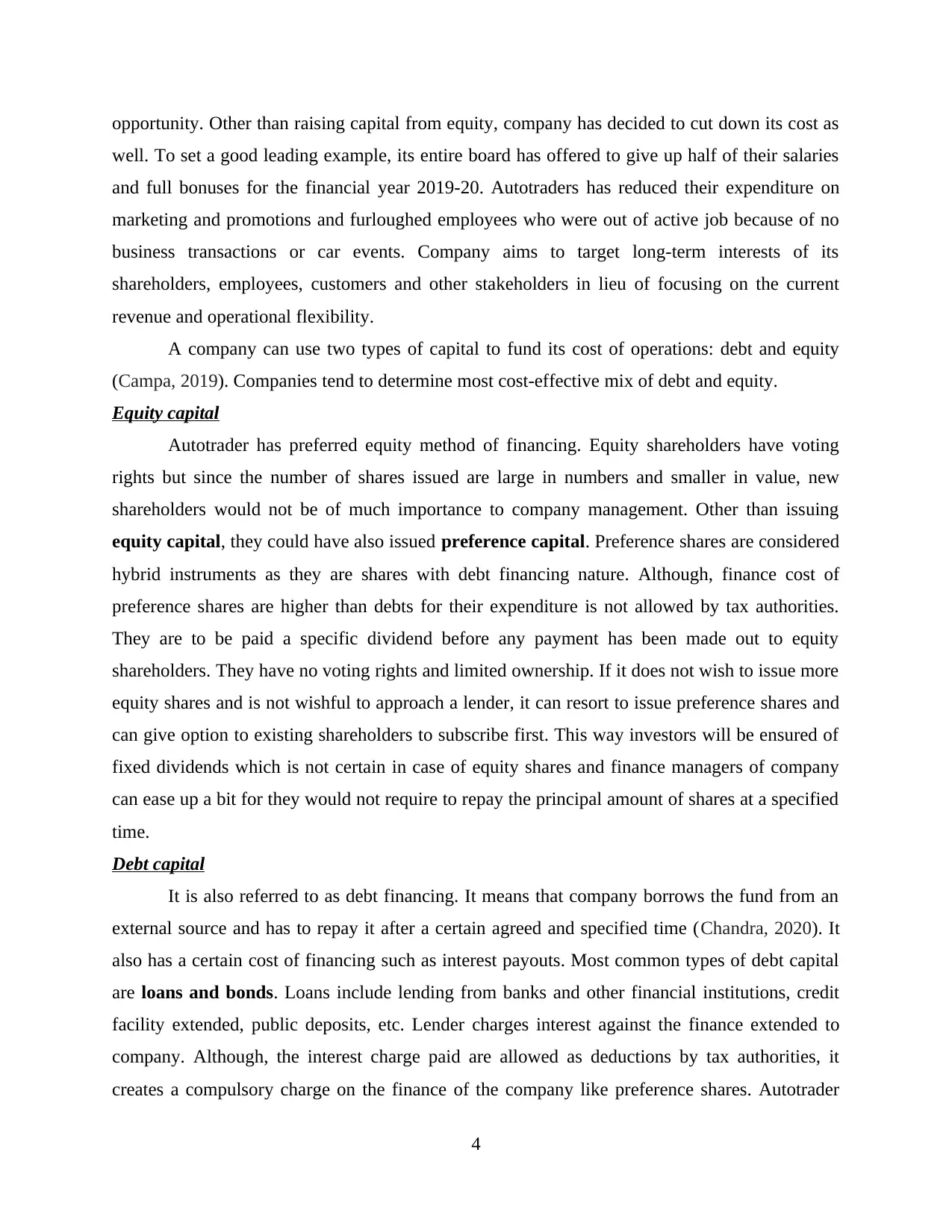
opportunity. Other than raising capital from equity, company has decided to cut down its cost as
well. To set a good leading example, its entire board has offered to give up half of their salaries
and full bonuses for the financial year 2019-20. Autotraders has reduced their expenditure on
marketing and promotions and furloughed employees who were out of active job because of no
business transactions or car events. Company aims to target long-term interests of its
shareholders, employees, customers and other stakeholders in lieu of focusing on the current
revenue and operational flexibility.
A company can use two types of capital to fund its cost of operations: debt and equity
(Campa, 2019). Companies tend to determine most cost-effective mix of debt and equity.
Equity capital
Autotrader has preferred equity method of financing. Equity shareholders have voting
rights but since the number of shares issued are large in numbers and smaller in value, new
shareholders would not be of much importance to company management. Other than issuing
equity capital, they could have also issued preference capital. Preference shares are considered
hybrid instruments as they are shares with debt financing nature. Although, finance cost of
preference shares are higher than debts for their expenditure is not allowed by tax authorities.
They are to be paid a specific dividend before any payment has been made out to equity
shareholders. They have no voting rights and limited ownership. If it does not wish to issue more
equity shares and is not wishful to approach a lender, it can resort to issue preference shares and
can give option to existing shareholders to subscribe first. This way investors will be ensured of
fixed dividends which is not certain in case of equity shares and finance managers of company
can ease up a bit for they would not require to repay the principal amount of shares at a specified
time.
Debt capital
It is also referred to as debt financing. It means that company borrows the fund from an
external source and has to repay it after a certain agreed and specified time (Chandra, 2020). It
also has a certain cost of financing such as interest payouts. Most common types of debt capital
are loans and bonds. Loans include lending from banks and other financial institutions, credit
facility extended, public deposits, etc. Lender charges interest against the finance extended to
company. Although, the interest charge paid are allowed as deductions by tax authorities, it
creates a compulsory charge on the finance of the company like preference shares. Autotrader
4
well. To set a good leading example, its entire board has offered to give up half of their salaries
and full bonuses for the financial year 2019-20. Autotraders has reduced their expenditure on
marketing and promotions and furloughed employees who were out of active job because of no
business transactions or car events. Company aims to target long-term interests of its
shareholders, employees, customers and other stakeholders in lieu of focusing on the current
revenue and operational flexibility.
A company can use two types of capital to fund its cost of operations: debt and equity
(Campa, 2019). Companies tend to determine most cost-effective mix of debt and equity.
Equity capital
Autotrader has preferred equity method of financing. Equity shareholders have voting
rights but since the number of shares issued are large in numbers and smaller in value, new
shareholders would not be of much importance to company management. Other than issuing
equity capital, they could have also issued preference capital. Preference shares are considered
hybrid instruments as they are shares with debt financing nature. Although, finance cost of
preference shares are higher than debts for their expenditure is not allowed by tax authorities.
They are to be paid a specific dividend before any payment has been made out to equity
shareholders. They have no voting rights and limited ownership. If it does not wish to issue more
equity shares and is not wishful to approach a lender, it can resort to issue preference shares and
can give option to existing shareholders to subscribe first. This way investors will be ensured of
fixed dividends which is not certain in case of equity shares and finance managers of company
can ease up a bit for they would not require to repay the principal amount of shares at a specified
time.
Debt capital
It is also referred to as debt financing. It means that company borrows the fund from an
external source and has to repay it after a certain agreed and specified time (Chandra, 2020). It
also has a certain cost of financing such as interest payouts. Most common types of debt capital
are loans and bonds. Loans include lending from banks and other financial institutions, credit
facility extended, public deposits, etc. Lender charges interest against the finance extended to
company. Although, the interest charge paid are allowed as deductions by tax authorities, it
creates a compulsory charge on the finance of the company like preference shares. Autotrader
4
Paraphrase This Document
Need a fresh take? Get an instant paraphrase of this document with our AI Paraphraser
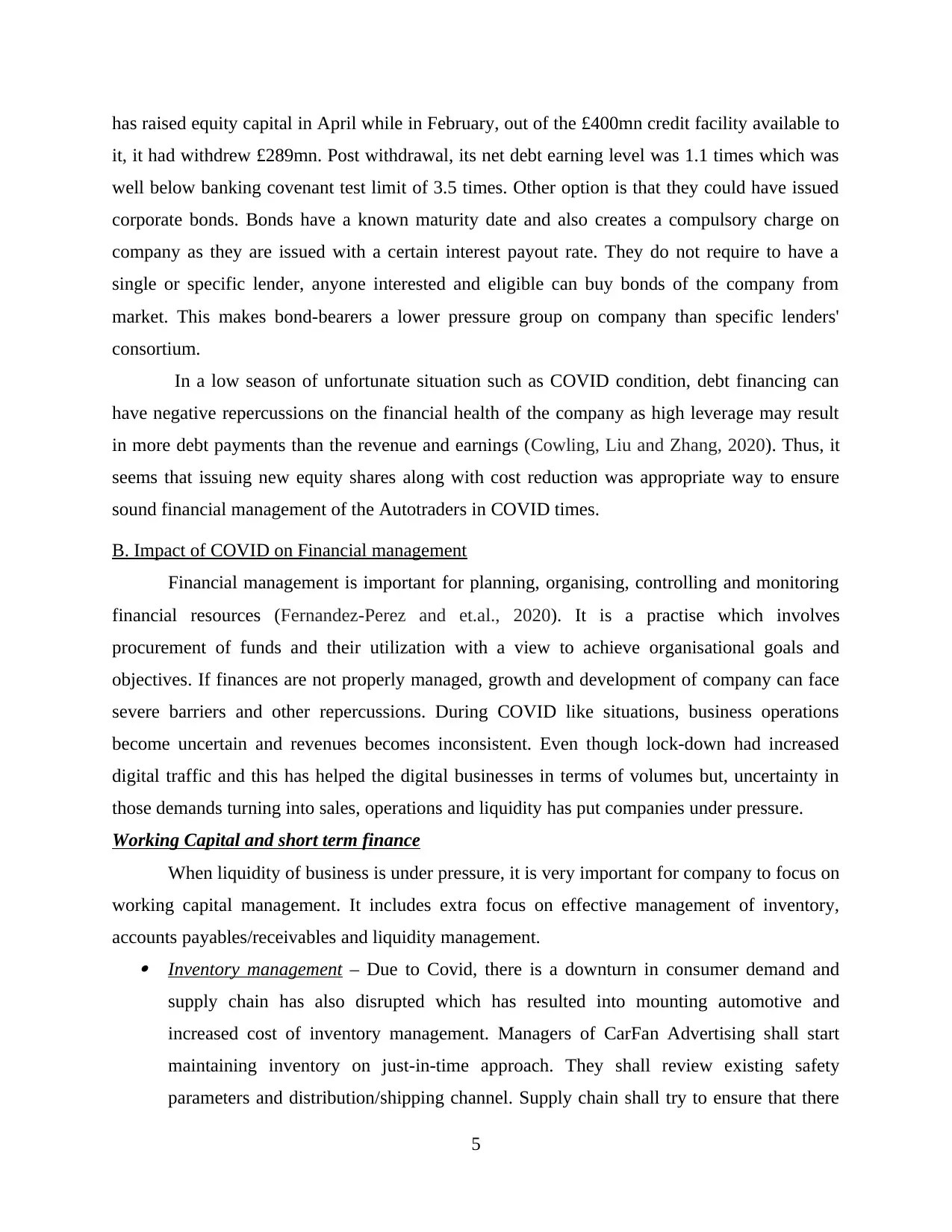
has raised equity capital in April while in February, out of the £400mn credit facility available to
it, it had withdrew £289mn. Post withdrawal, its net debt earning level was 1.1 times which was
well below banking covenant test limit of 3.5 times. Other option is that they could have issued
corporate bonds. Bonds have a known maturity date and also creates a compulsory charge on
company as they are issued with a certain interest payout rate. They do not require to have a
single or specific lender, anyone interested and eligible can buy bonds of the company from
market. This makes bond-bearers a lower pressure group on company than specific lenders'
consortium.
In a low season of unfortunate situation such as COVID condition, debt financing can
have negative repercussions on the financial health of the company as high leverage may result
in more debt payments than the revenue and earnings (Cowling, Liu and Zhang, 2020). Thus, it
seems that issuing new equity shares along with cost reduction was appropriate way to ensure
sound financial management of the Autotraders in COVID times.
B. Impact of COVID on Financial management
Financial management is important for planning, organising, controlling and monitoring
financial resources (Fernandez-Perez and et.al., 2020). It is a practise which involves
procurement of funds and their utilization with a view to achieve organisational goals and
objectives. If finances are not properly managed, growth and development of company can face
severe barriers and other repercussions. During COVID like situations, business operations
become uncertain and revenues becomes inconsistent. Even though lock-down had increased
digital traffic and this has helped the digital businesses in terms of volumes but, uncertainty in
those demands turning into sales, operations and liquidity has put companies under pressure.
Working Capital and short term finance
When liquidity of business is under pressure, it is very important for company to focus on
working capital management. It includes extra focus on effective management of inventory,
accounts payables/receivables and liquidity management. Inventory management – Due to Covid, there is a downturn in consumer demand and
supply chain has also disrupted which has resulted into mounting automotive and
increased cost of inventory management. Managers of CarFan Advertising shall start
maintaining inventory on just-in-time approach. They shall review existing safety
parameters and distribution/shipping channel. Supply chain shall try to ensure that there
5
it, it had withdrew £289mn. Post withdrawal, its net debt earning level was 1.1 times which was
well below banking covenant test limit of 3.5 times. Other option is that they could have issued
corporate bonds. Bonds have a known maturity date and also creates a compulsory charge on
company as they are issued with a certain interest payout rate. They do not require to have a
single or specific lender, anyone interested and eligible can buy bonds of the company from
market. This makes bond-bearers a lower pressure group on company than specific lenders'
consortium.
In a low season of unfortunate situation such as COVID condition, debt financing can
have negative repercussions on the financial health of the company as high leverage may result
in more debt payments than the revenue and earnings (Cowling, Liu and Zhang, 2020). Thus, it
seems that issuing new equity shares along with cost reduction was appropriate way to ensure
sound financial management of the Autotraders in COVID times.
B. Impact of COVID on Financial management
Financial management is important for planning, organising, controlling and monitoring
financial resources (Fernandez-Perez and et.al., 2020). It is a practise which involves
procurement of funds and their utilization with a view to achieve organisational goals and
objectives. If finances are not properly managed, growth and development of company can face
severe barriers and other repercussions. During COVID like situations, business operations
become uncertain and revenues becomes inconsistent. Even though lock-down had increased
digital traffic and this has helped the digital businesses in terms of volumes but, uncertainty in
those demands turning into sales, operations and liquidity has put companies under pressure.
Working Capital and short term finance
When liquidity of business is under pressure, it is very important for company to focus on
working capital management. It includes extra focus on effective management of inventory,
accounts payables/receivables and liquidity management. Inventory management – Due to Covid, there is a downturn in consumer demand and
supply chain has also disrupted which has resulted into mounting automotive and
increased cost of inventory management. Managers of CarFan Advertising shall start
maintaining inventory on just-in-time approach. They shall review existing safety
parameters and distribution/shipping channel. Supply chain shall try to ensure that there
5
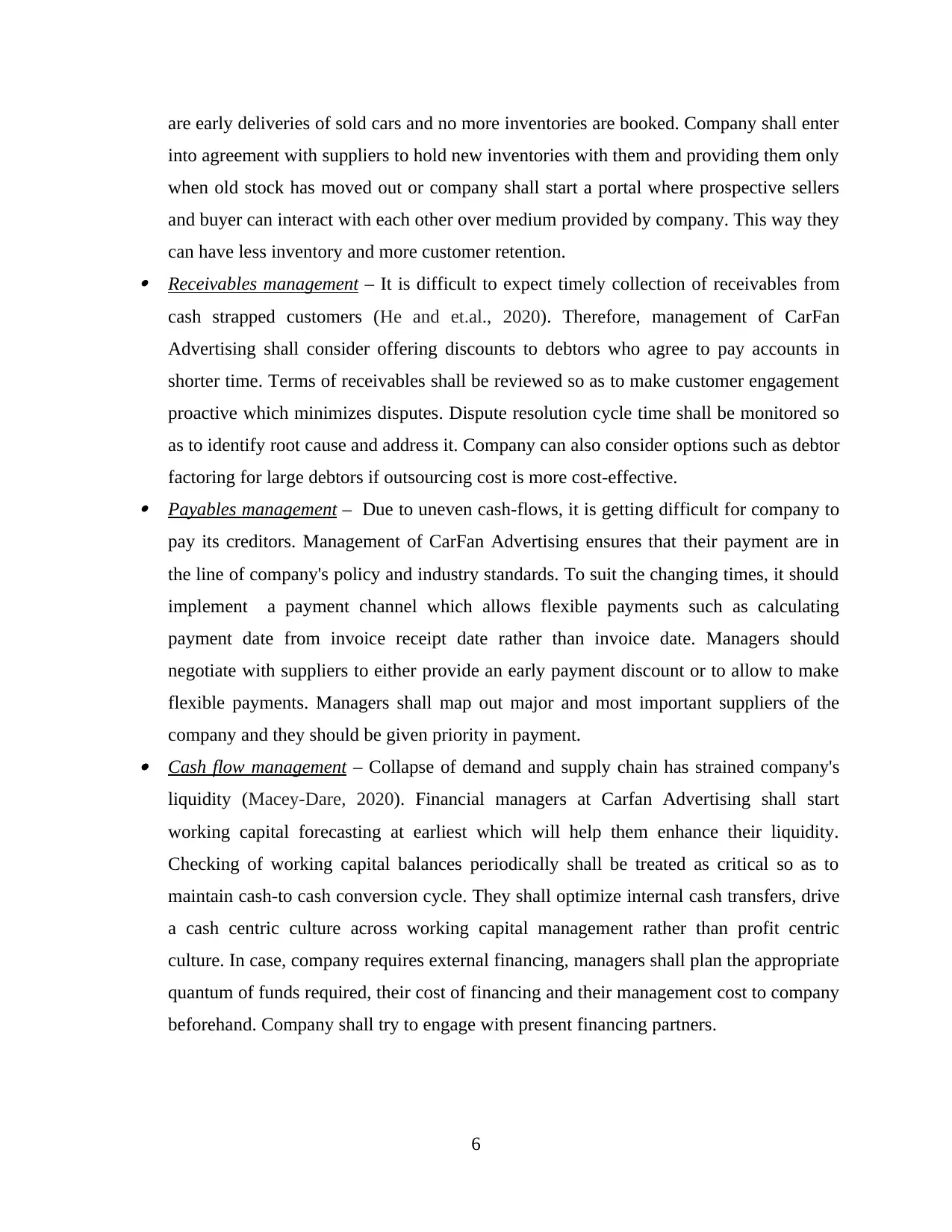
are early deliveries of sold cars and no more inventories are booked. Company shall enter
into agreement with suppliers to hold new inventories with them and providing them only
when old stock has moved out or company shall start a portal where prospective sellers
and buyer can interact with each other over medium provided by company. This way they
can have less inventory and more customer retention. Receivables management – It is difficult to expect timely collection of receivables from
cash strapped customers (He and et.al., 2020). Therefore, management of CarFan
Advertising shall consider offering discounts to debtors who agree to pay accounts in
shorter time. Terms of receivables shall be reviewed so as to make customer engagement
proactive which minimizes disputes. Dispute resolution cycle time shall be monitored so
as to identify root cause and address it. Company can also consider options such as debtor
factoring for large debtors if outsourcing cost is more cost-effective. Payables management – Due to uneven cash-flows, it is getting difficult for company to
pay its creditors. Management of CarFan Advertising ensures that their payment are in
the line of company's policy and industry standards. To suit the changing times, it should
implement a payment channel which allows flexible payments such as calculating
payment date from invoice receipt date rather than invoice date. Managers should
negotiate with suppliers to either provide an early payment discount or to allow to make
flexible payments. Managers shall map out major and most important suppliers of the
company and they should be given priority in payment. Cash flow management – Collapse of demand and supply chain has strained company's
liquidity (Macey-Dare, 2020). Financial managers at Carfan Advertising shall start
working capital forecasting at earliest which will help them enhance their liquidity.
Checking of working capital balances periodically shall be treated as critical so as to
maintain cash-to cash conversion cycle. They shall optimize internal cash transfers, drive
a cash centric culture across working capital management rather than profit centric
culture. In case, company requires external financing, managers shall plan the appropriate
quantum of funds required, their cost of financing and their management cost to company
beforehand. Company shall try to engage with present financing partners.
6
into agreement with suppliers to hold new inventories with them and providing them only
when old stock has moved out or company shall start a portal where prospective sellers
and buyer can interact with each other over medium provided by company. This way they
can have less inventory and more customer retention. Receivables management – It is difficult to expect timely collection of receivables from
cash strapped customers (He and et.al., 2020). Therefore, management of CarFan
Advertising shall consider offering discounts to debtors who agree to pay accounts in
shorter time. Terms of receivables shall be reviewed so as to make customer engagement
proactive which minimizes disputes. Dispute resolution cycle time shall be monitored so
as to identify root cause and address it. Company can also consider options such as debtor
factoring for large debtors if outsourcing cost is more cost-effective. Payables management – Due to uneven cash-flows, it is getting difficult for company to
pay its creditors. Management of CarFan Advertising ensures that their payment are in
the line of company's policy and industry standards. To suit the changing times, it should
implement a payment channel which allows flexible payments such as calculating
payment date from invoice receipt date rather than invoice date. Managers should
negotiate with suppliers to either provide an early payment discount or to allow to make
flexible payments. Managers shall map out major and most important suppliers of the
company and they should be given priority in payment. Cash flow management – Collapse of demand and supply chain has strained company's
liquidity (Macey-Dare, 2020). Financial managers at Carfan Advertising shall start
working capital forecasting at earliest which will help them enhance their liquidity.
Checking of working capital balances periodically shall be treated as critical so as to
maintain cash-to cash conversion cycle. They shall optimize internal cash transfers, drive
a cash centric culture across working capital management rather than profit centric
culture. In case, company requires external financing, managers shall plan the appropriate
quantum of funds required, their cost of financing and their management cost to company
beforehand. Company shall try to engage with present financing partners.
6
⊘ This is a preview!⊘
Do you want full access?
Subscribe today to unlock all pages.

Trusted by 1+ million students worldwide
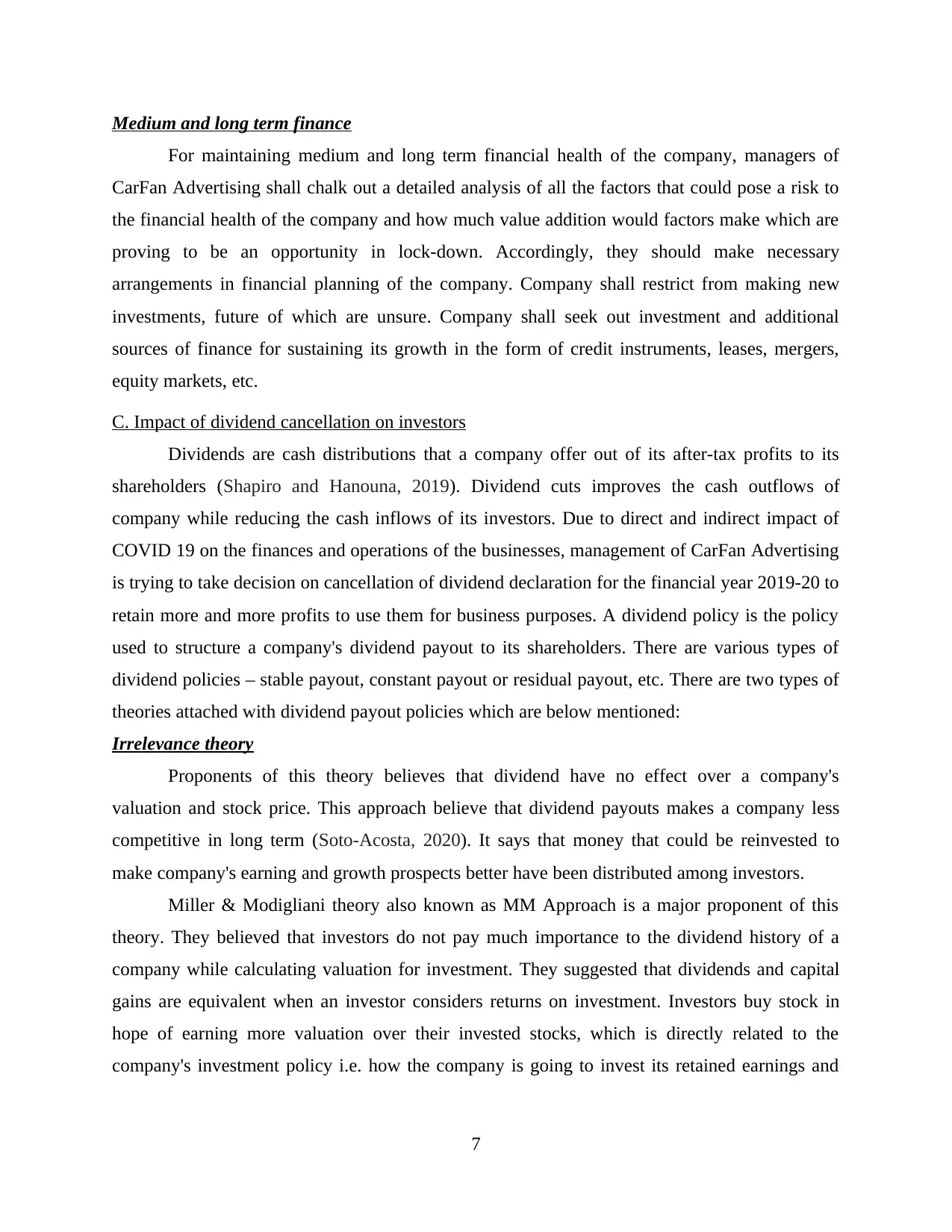
Medium and long term finance
For maintaining medium and long term financial health of the company, managers of
CarFan Advertising shall chalk out a detailed analysis of all the factors that could pose a risk to
the financial health of the company and how much value addition would factors make which are
proving to be an opportunity in lock-down. Accordingly, they should make necessary
arrangements in financial planning of the company. Company shall restrict from making new
investments, future of which are unsure. Company shall seek out investment and additional
sources of finance for sustaining its growth in the form of credit instruments, leases, mergers,
equity markets, etc.
C. Impact of dividend cancellation on investors
Dividends are cash distributions that a company offer out of its after-tax profits to its
shareholders (Shapiro and Hanouna, 2019). Dividend cuts improves the cash outflows of
company while reducing the cash inflows of its investors. Due to direct and indirect impact of
COVID 19 on the finances and operations of the businesses, management of CarFan Advertising
is trying to take decision on cancellation of dividend declaration for the financial year 2019-20 to
retain more and more profits to use them for business purposes. A dividend policy is the policy
used to structure a company's dividend payout to its shareholders. There are various types of
dividend policies – stable payout, constant payout or residual payout, etc. There are two types of
theories attached with dividend payout policies which are below mentioned:
Irrelevance theory
Proponents of this theory believes that dividend have no effect over a company's
valuation and stock price. This approach believe that dividend payouts makes a company less
competitive in long term (Soto-Acosta, 2020). It says that money that could be reinvested to
make company's earning and growth prospects better have been distributed among investors.
Miller & Modigliani theory also known as MM Approach is a major proponent of this
theory. They believed that investors do not pay much importance to the dividend history of a
company while calculating valuation for investment. They suggested that dividends and capital
gains are equivalent when an investor considers returns on investment. Investors buy stock in
hope of earning more valuation over their invested stocks, which is directly related to the
company's investment policy i.e. how the company is going to invest its retained earnings and
7
For maintaining medium and long term financial health of the company, managers of
CarFan Advertising shall chalk out a detailed analysis of all the factors that could pose a risk to
the financial health of the company and how much value addition would factors make which are
proving to be an opportunity in lock-down. Accordingly, they should make necessary
arrangements in financial planning of the company. Company shall restrict from making new
investments, future of which are unsure. Company shall seek out investment and additional
sources of finance for sustaining its growth in the form of credit instruments, leases, mergers,
equity markets, etc.
C. Impact of dividend cancellation on investors
Dividends are cash distributions that a company offer out of its after-tax profits to its
shareholders (Shapiro and Hanouna, 2019). Dividend cuts improves the cash outflows of
company while reducing the cash inflows of its investors. Due to direct and indirect impact of
COVID 19 on the finances and operations of the businesses, management of CarFan Advertising
is trying to take decision on cancellation of dividend declaration for the financial year 2019-20 to
retain more and more profits to use them for business purposes. A dividend policy is the policy
used to structure a company's dividend payout to its shareholders. There are various types of
dividend policies – stable payout, constant payout or residual payout, etc. There are two types of
theories attached with dividend payout policies which are below mentioned:
Irrelevance theory
Proponents of this theory believes that dividend have no effect over a company's
valuation and stock price. This approach believe that dividend payouts makes a company less
competitive in long term (Soto-Acosta, 2020). It says that money that could be reinvested to
make company's earning and growth prospects better have been distributed among investors.
Miller & Modigliani theory also known as MM Approach is a major proponent of this
theory. They believed that investors do not pay much importance to the dividend history of a
company while calculating valuation for investment. They suggested that dividends and capital
gains are equivalent when an investor considers returns on investment. Investors buy stock in
hope of earning more valuation over their invested stocks, which is directly related to the
company's investment policy i.e. how the company is going to invest its retained earnings and
7
Paraphrase This Document
Need a fresh take? Get an instant paraphrase of this document with our AI Paraphraser
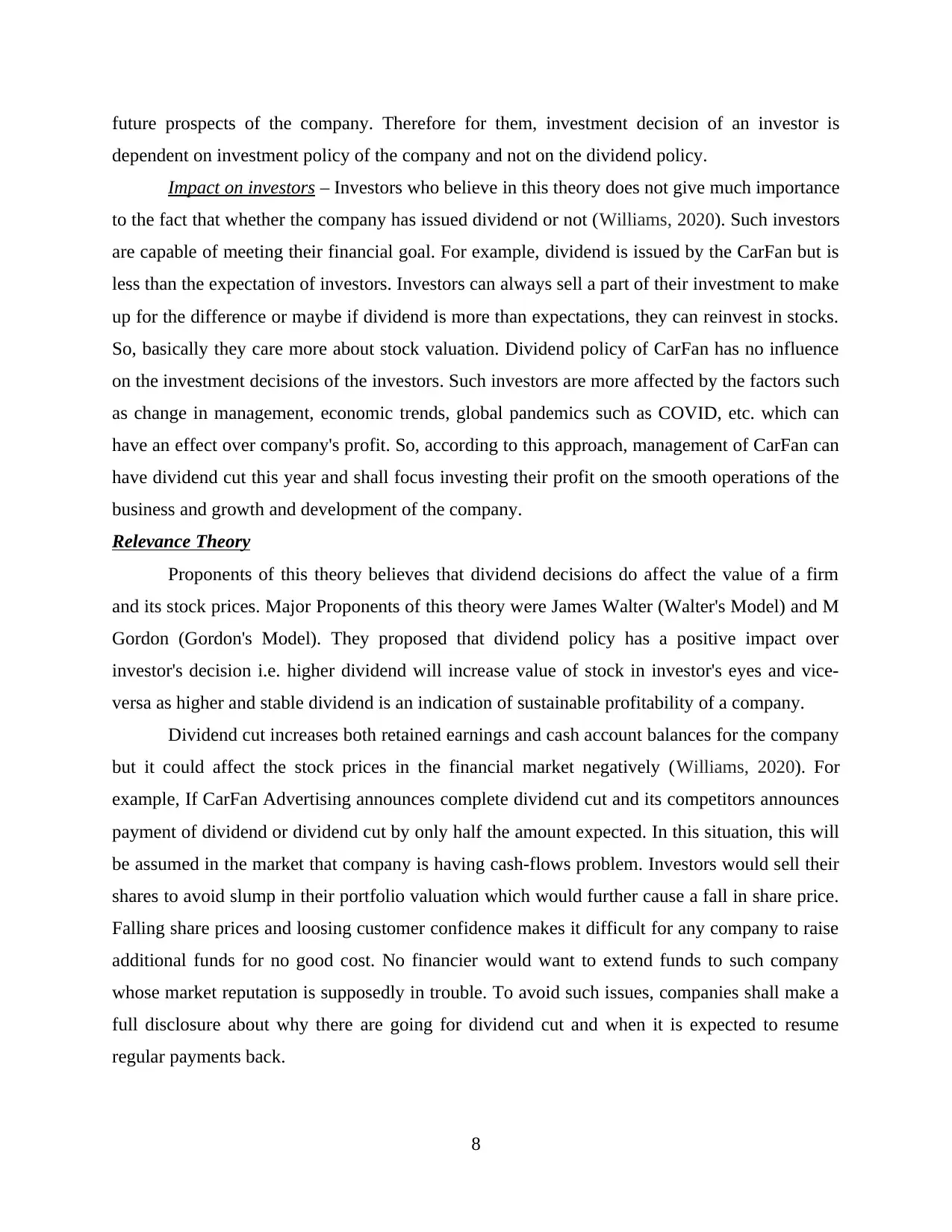
future prospects of the company. Therefore for them, investment decision of an investor is
dependent on investment policy of the company and not on the dividend policy.
Impact on investors – Investors who believe in this theory does not give much importance
to the fact that whether the company has issued dividend or not (Williams, 2020). Such investors
are capable of meeting their financial goal. For example, dividend is issued by the CarFan but is
less than the expectation of investors. Investors can always sell a part of their investment to make
up for the difference or maybe if dividend is more than expectations, they can reinvest in stocks.
So, basically they care more about stock valuation. Dividend policy of CarFan has no influence
on the investment decisions of the investors. Such investors are more affected by the factors such
as change in management, economic trends, global pandemics such as COVID, etc. which can
have an effect over company's profit. So, according to this approach, management of CarFan can
have dividend cut this year and shall focus investing their profit on the smooth operations of the
business and growth and development of the company.
Relevance Theory
Proponents of this theory believes that dividend decisions do affect the value of a firm
and its stock prices. Major Proponents of this theory were James Walter (Walter's Model) and M
Gordon (Gordon's Model). They proposed that dividend policy has a positive impact over
investor's decision i.e. higher dividend will increase value of stock in investor's eyes and vice-
versa as higher and stable dividend is an indication of sustainable profitability of a company.
Dividend cut increases both retained earnings and cash account balances for the company
but it could affect the stock prices in the financial market negatively (Williams, 2020). For
example, If CarFan Advertising announces complete dividend cut and its competitors announces
payment of dividend or dividend cut by only half the amount expected. In this situation, this will
be assumed in the market that company is having cash-flows problem. Investors would sell their
shares to avoid slump in their portfolio valuation which would further cause a fall in share price.
Falling share prices and loosing customer confidence makes it difficult for any company to raise
additional funds for no good cost. No financier would want to extend funds to such company
whose market reputation is supposedly in trouble. To avoid such issues, companies shall make a
full disclosure about why there are going for dividend cut and when it is expected to resume
regular payments back.
8
dependent on investment policy of the company and not on the dividend policy.
Impact on investors – Investors who believe in this theory does not give much importance
to the fact that whether the company has issued dividend or not (Williams, 2020). Such investors
are capable of meeting their financial goal. For example, dividend is issued by the CarFan but is
less than the expectation of investors. Investors can always sell a part of their investment to make
up for the difference or maybe if dividend is more than expectations, they can reinvest in stocks.
So, basically they care more about stock valuation. Dividend policy of CarFan has no influence
on the investment decisions of the investors. Such investors are more affected by the factors such
as change in management, economic trends, global pandemics such as COVID, etc. which can
have an effect over company's profit. So, according to this approach, management of CarFan can
have dividend cut this year and shall focus investing their profit on the smooth operations of the
business and growth and development of the company.
Relevance Theory
Proponents of this theory believes that dividend decisions do affect the value of a firm
and its stock prices. Major Proponents of this theory were James Walter (Walter's Model) and M
Gordon (Gordon's Model). They proposed that dividend policy has a positive impact over
investor's decision i.e. higher dividend will increase value of stock in investor's eyes and vice-
versa as higher and stable dividend is an indication of sustainable profitability of a company.
Dividend cut increases both retained earnings and cash account balances for the company
but it could affect the stock prices in the financial market negatively (Williams, 2020). For
example, If CarFan Advertising announces complete dividend cut and its competitors announces
payment of dividend or dividend cut by only half the amount expected. In this situation, this will
be assumed in the market that company is having cash-flows problem. Investors would sell their
shares to avoid slump in their portfolio valuation which would further cause a fall in share price.
Falling share prices and loosing customer confidence makes it difficult for any company to raise
additional funds for no good cost. No financier would want to extend funds to such company
whose market reputation is supposedly in trouble. To avoid such issues, companies shall make a
full disclosure about why there are going for dividend cut and when it is expected to resume
regular payments back.
8
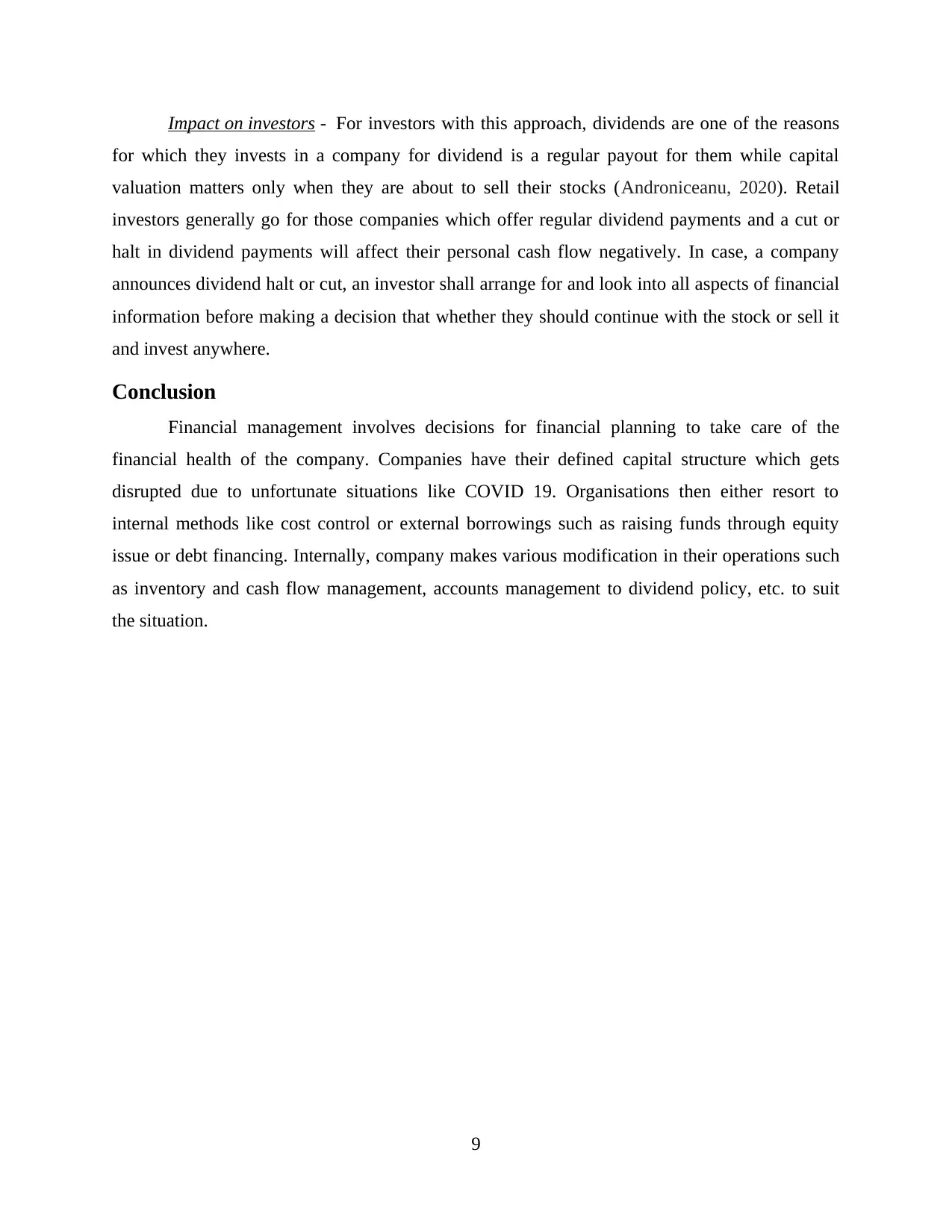
Impact on investors - For investors with this approach, dividends are one of the reasons
for which they invests in a company for dividend is a regular payout for them while capital
valuation matters only when they are about to sell their stocks (Androniceanu, 2020). Retail
investors generally go for those companies which offer regular dividend payments and a cut or
halt in dividend payments will affect their personal cash flow negatively. In case, a company
announces dividend halt or cut, an investor shall arrange for and look into all aspects of financial
information before making a decision that whether they should continue with the stock or sell it
and invest anywhere.
Conclusion
Financial management involves decisions for financial planning to take care of the
financial health of the company. Companies have their defined capital structure which gets
disrupted due to unfortunate situations like COVID 19. Organisations then either resort to
internal methods like cost control or external borrowings such as raising funds through equity
issue or debt financing. Internally, company makes various modification in their operations such
as inventory and cash flow management, accounts management to dividend policy, etc. to suit
the situation.
9
for which they invests in a company for dividend is a regular payout for them while capital
valuation matters only when they are about to sell their stocks (Androniceanu, 2020). Retail
investors generally go for those companies which offer regular dividend payments and a cut or
halt in dividend payments will affect their personal cash flow negatively. In case, a company
announces dividend halt or cut, an investor shall arrange for and look into all aspects of financial
information before making a decision that whether they should continue with the stock or sell it
and invest anywhere.
Conclusion
Financial management involves decisions for financial planning to take care of the
financial health of the company. Companies have their defined capital structure which gets
disrupted due to unfortunate situations like COVID 19. Organisations then either resort to
internal methods like cost control or external borrowings such as raising funds through equity
issue or debt financing. Internally, company makes various modification in their operations such
as inventory and cash flow management, accounts management to dividend policy, etc. to suit
the situation.
9
⊘ This is a preview!⊘
Do you want full access?
Subscribe today to unlock all pages.

Trusted by 1+ million students worldwide
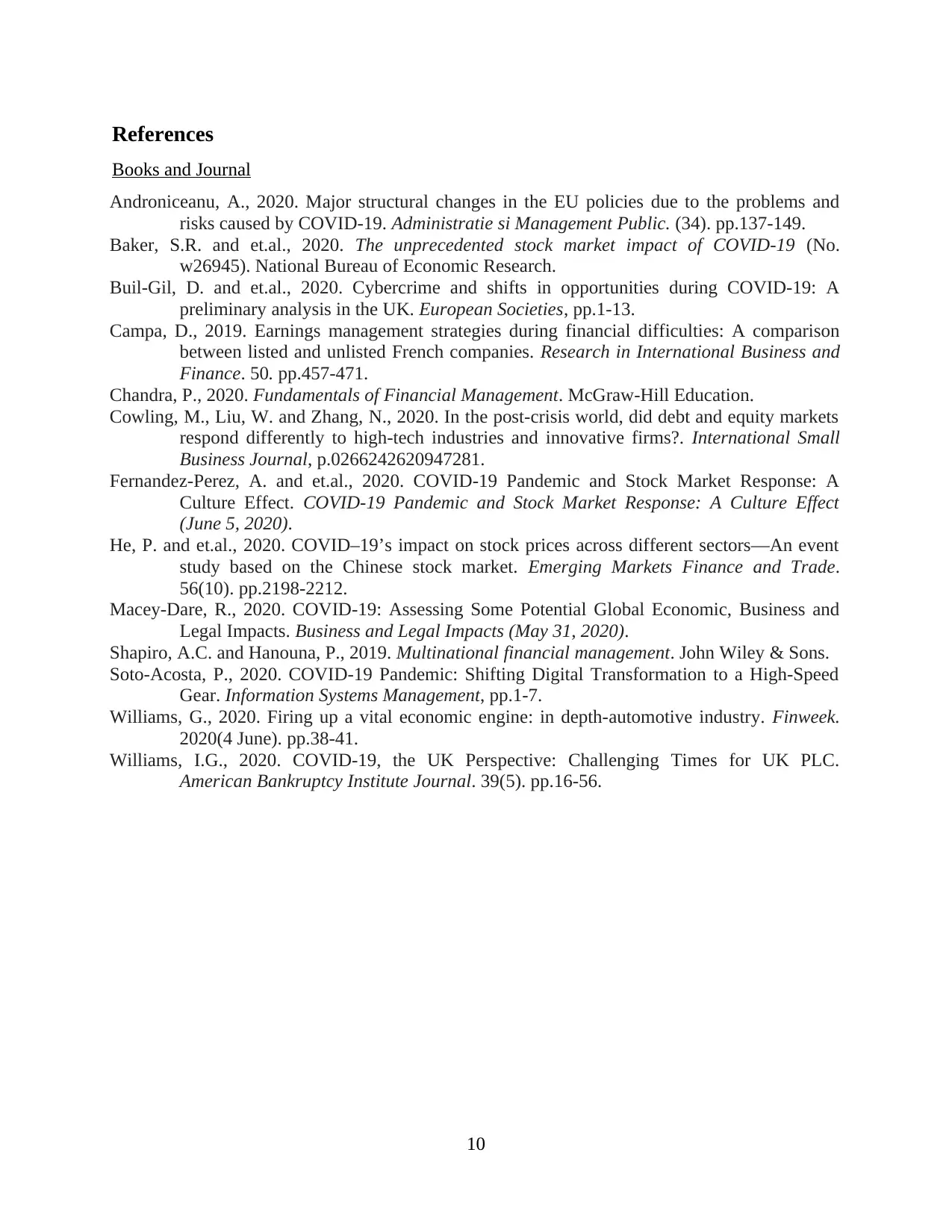
References
Books and Journal
Androniceanu, A., 2020. Major structural changes in the EU policies due to the problems and
risks caused by COVID-19. Administratie si Management Public. (34). pp.137-149.
Baker, S.R. and et.al., 2020. The unprecedented stock market impact of COVID-19 (No.
w26945). National Bureau of Economic Research.
Buil-Gil, D. and et.al., 2020. Cybercrime and shifts in opportunities during COVID-19: A
preliminary analysis in the UK. European Societies, pp.1-13.
Campa, D., 2019. Earnings management strategies during financial difficulties: A comparison
between listed and unlisted French companies. Research in International Business and
Finance. 50. pp.457-471.
Chandra, P., 2020. Fundamentals of Financial Management. McGraw-Hill Education.
Cowling, M., Liu, W. and Zhang, N., 2020. In the post-crisis world, did debt and equity markets
respond differently to high-tech industries and innovative firms?. International Small
Business Journal, p.0266242620947281.
Fernandez-Perez, A. and et.al., 2020. COVID-19 Pandemic and Stock Market Response: A
Culture Effect. COVID-19 Pandemic and Stock Market Response: A Culture Effect
(June 5, 2020).
He, P. and et.al., 2020. COVID–19’s impact on stock prices across different sectors—An event
study based on the Chinese stock market. Emerging Markets Finance and Trade.
56(10). pp.2198-2212.
Macey-Dare, R., 2020. COVID-19: Assessing Some Potential Global Economic, Business and
Legal Impacts. Business and Legal Impacts (May 31, 2020).
Shapiro, A.C. and Hanouna, P., 2019. Multinational financial management. John Wiley & Sons.
Soto-Acosta, P., 2020. COVID-19 Pandemic: Shifting Digital Transformation to a High-Speed
Gear. Information Systems Management, pp.1-7.
Williams, G., 2020. Firing up a vital economic engine: in depth-automotive industry. Finweek.
2020(4 June). pp.38-41.
Williams, I.G., 2020. COVID-19, the UK Perspective: Challenging Times for UK PLC.
American Bankruptcy Institute Journal. 39(5). pp.16-56.
10
Books and Journal
Androniceanu, A., 2020. Major structural changes in the EU policies due to the problems and
risks caused by COVID-19. Administratie si Management Public. (34). pp.137-149.
Baker, S.R. and et.al., 2020. The unprecedented stock market impact of COVID-19 (No.
w26945). National Bureau of Economic Research.
Buil-Gil, D. and et.al., 2020. Cybercrime and shifts in opportunities during COVID-19: A
preliminary analysis in the UK. European Societies, pp.1-13.
Campa, D., 2019. Earnings management strategies during financial difficulties: A comparison
between listed and unlisted French companies. Research in International Business and
Finance. 50. pp.457-471.
Chandra, P., 2020. Fundamentals of Financial Management. McGraw-Hill Education.
Cowling, M., Liu, W. and Zhang, N., 2020. In the post-crisis world, did debt and equity markets
respond differently to high-tech industries and innovative firms?. International Small
Business Journal, p.0266242620947281.
Fernandez-Perez, A. and et.al., 2020. COVID-19 Pandemic and Stock Market Response: A
Culture Effect. COVID-19 Pandemic and Stock Market Response: A Culture Effect
(June 5, 2020).
He, P. and et.al., 2020. COVID–19’s impact on stock prices across different sectors—An event
study based on the Chinese stock market. Emerging Markets Finance and Trade.
56(10). pp.2198-2212.
Macey-Dare, R., 2020. COVID-19: Assessing Some Potential Global Economic, Business and
Legal Impacts. Business and Legal Impacts (May 31, 2020).
Shapiro, A.C. and Hanouna, P., 2019. Multinational financial management. John Wiley & Sons.
Soto-Acosta, P., 2020. COVID-19 Pandemic: Shifting Digital Transformation to a High-Speed
Gear. Information Systems Management, pp.1-7.
Williams, G., 2020. Firing up a vital economic engine: in depth-automotive industry. Finweek.
2020(4 June). pp.38-41.
Williams, I.G., 2020. COVID-19, the UK Perspective: Challenging Times for UK PLC.
American Bankruptcy Institute Journal. 39(5). pp.16-56.
10
1 out of 10
Related Documents
Your All-in-One AI-Powered Toolkit for Academic Success.
+13062052269
info@desklib.com
Available 24*7 on WhatsApp / Email
![[object Object]](/_next/static/media/star-bottom.7253800d.svg)
Unlock your academic potential
Copyright © 2020–2026 A2Z Services. All Rights Reserved. Developed and managed by ZUCOL.





